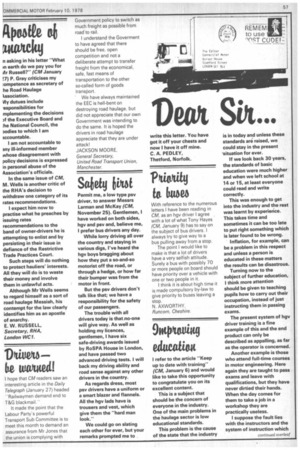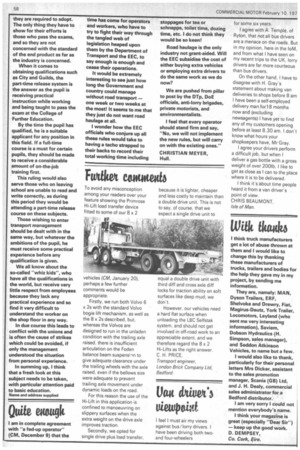9111 ptaviag
Page 59

Page 60

If you've noticed an error in this article please click here to report it so we can fix it.
educe/lea
I refer to the article "Keep up to date with training" (CM, January 6) and would like to take this opportunity to congratulate you on its excellent content.
This is a subject that should be the concern of everyone in the industry. One of the main problems in the haulage sector is low educational standards.
This problem is the cause of the state that the industry is in today and unless these standards are raised, we could stay in the present 'situation for ever.
If we look back 30 years, the standards of basic education were much higher and when we left school at 14 or 15, at least everyone could read and write correctly.
This was enough to get into the industry and the rest was learnt by experience. This takes time and sometimes it can be too late to put right something which is later found to be wrong.
Inflation, for example, can be a problem in this respect and unless a person is educated in these matters the results can be disastrous.
Turning now to the subject of further education, I think more attention should be given to teaching pupils how to carry out their occupation, instead of just instructing them in passing exams.
The present system of hgv driver training is a fine example of this and the end product can only be described as appalling, as far as the operator is concerned.
Another example is those who attend full-time courses in motor engineering. Here again they are taught to pass exams and leave with qualifications, but they have never dirtied their hands. When the day comes for them to take a job in a workshop they are practically useless_ I suppose the fault lies with the instructors and the system of instruction which they are required to adopt. The only thing they have to show for their efforts is those who pass the exams, and so they are not concerned with the standard of the end product as far as the industry is concerned.
When it comes to obtaining qualifications such as City and Guilds, the part-time release system is the answer as the pupil is receiving practical instruction while working and being taught to pass the exam at the College of Further Education.
By the time the pupil has qualified, he is a suitable applicant for any position in this field. If a full-time course is a must for certain pupils, they should be made to receive a considerable amount of on-the-job training first.
This ruling would also serve those who on leaving school are unable to read and write correctly, as during this period they would be attending a part-time release course on these subjects.
Those wishing to enter transport management should be dealt with in the same way, but whatever the ambitions of the pupil, he must receive some practical experience before any qualification is given.
We all know about the so-called "whiz kids", who have all the qualifications in the world, but receive very little respect from employees because they lack any practical experience and so find it very difficult to understand the worker on the shop floor in any way.
In due course this leads to conflict with the unions and is often the cause of strikes which could be avoided, if only the management understood the situation from personal experience.
In summing up, I think that a fresh look at this subject needs to be taken, with particular attention paid to basic education.
Name and address supplied












































































































